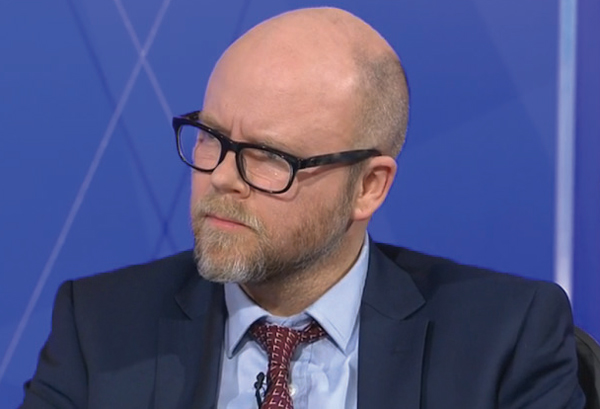Faith groups wanting to open new schools may find the government “makes it easier” to set up voluntary-aided schools if the cap on faith-based places is not lifted, Toby Young told a forum this morning.
He also revealed that the government had not yet decided what it would do with the £50 million set aside in the spring budget to allow grammar schools to expand.
It is now unlikely that the rule that limits selection on the basis of faith to 50 per cent of places will be lifted, as the government had intended before the election, the founder of the New Schools Network claimed.
But one “possibility” would be to make it easier to open voluntary-aided schools, Young (pictured) told the Westminster Education Forum in London.
However, this is “pure speculation”, and does not reflect any insider information from the Department for Education, he confirmed.

One way for more voluntary-aided schools to open would be for local authorities to get more money, since they currently have to contribute to the “lion’s share” of the cost, Young said.
Catholic groups are still awaiting a decision on lifting the 50-per-cent faith-based cap first proposed in the government’s white paper earlier this year.
Peter Taylor, assistant director for education at the Catholic Education Service, said it was “interesting” to hear Young talk about “making it easier to set up voluntary-aided schools” but that, so far, his group had “not had any indication the government are looking to do that”.
On the matter of the £50 million put aside to expand grammar schools, Young claimed the unexpected election result meant that while more new selective schools were unlikely, the cash could still be used to allow grammar schools to expand satellite sites.
The Weald of Kent Girls grammar school in Tonbridge opened its new “satellite” annex more than 10 miles away from its original site last week, after being given permission by the former education secretary Nicky Morgan.








Religion and society are like oil and water. Keep it away.
Why should LAs set up VA schools when they would probably convert to academy status?
Perhaps because in most cases the foundation (usually the Diocese) owns and provides the land and buildings. This would make it a very attractive option for a local authority which might otherwise find itself having to fund the expansion of existing schools to provide the necessary places to satisfy its statutory duty to educate the children in its area.
Promoters set up VA schools, LAs do not, but have to agree to maintain them. Even at 90% subsidy, the cost of land and buildings to many dioceses would be considerable compared to their available funds. However, I note two VA schools were established in 2016, one a from the ‘closure’ of a community school with the LA presumably conveying the land and buildings to the trustees in order for it to reopen as a CoE VA school, the other was an established Jewish independent school with the trustees presumably still owning the land and buildings as with LA maintaining the school.
Not sure about this. The guidance re ‘Free School Presumption’ says:
‘As under the previous new school competition arrangements, the local authority is responsible for providing the site for the new school and meeting the associated capital costs.’
The guidance also requires LAs who identify the need for a new school to confirm ‘the local authority will meet all pre- and post-opening costs associated with establishing the new school’ and ‘provide the site for the new school’.
I admit to being confused because when free school proposals are approved by the DfE, it’s the Education and Skills Funding Agency who buys a site – something that can be difficult and which has also cause ESFA to pay over the odds. The establishment of free schools can also leave an LA out-of-pocket (see my LSN article 27/2/14 ‘Council estimates £4m loss on land grabbed by DfE for free school’. I can’t provide a link because I’ve already supplied one and I might get stuck in moderation if I supply two).
http://dera.ioe.ac.uk/25495/1/Free_school_presumption_guidance_11_February_2016.pdf
It seems state schools are less enlightened today than in the late 1890s: http://www.localschoolsnetwork.org.uk/2017/09/why-has-our-state-education-system-retreated-on-the-right-of-parents-to-secure-a-secular-education-for-their-children-0
Most of s.7, Elementary Education Act (referenced in the LSN article) can be traced to extant legislation, e.g. s.398 Education Act 1996, but it only applies to maintained schools. As evidence of the chaotic development of the statutory basis of the school system since 2010, these provisions do not apply to Academies, and I do not know of a debate that they should apply. Could a learned advocate of academies enlighten me, should I be wrong?
I recall that when the 50% rule was announced in 2010, there was a DfE FAQ on Free Schools which advised promoters who wanted to have a 100% faith admissions rule to go through the VA route. I did not have the privilege of listening to Mr Young, but he needs to mug up on the capital funding of VA schools, but pleased he has become an advocate of more LA maintained schools.
The 50% rule can easily be overcome if there are not enough applicants to fill the 50% non-faith places. These places can then be filled by faith applicants. That was how Al-Madinah managed a nearly 100% Muslim intake.
“if there are not enough applicants to fill the 50% non-faith places”
Janet, they are not “non faith places”. They are “without reference to faith” places. Muslim applicants are just as entitled to them as anyone else, and may also be much more likely to want them. See this excellent Wikipedia page for details of the 50% rule and its history: https://en.wikipedia.org/wiki/The_50%25_Rule